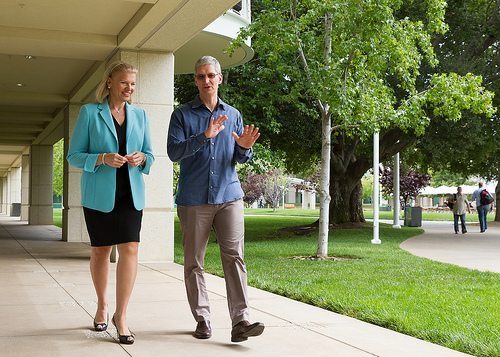IBM and Apple have announced a major global collaboration for enterprise mobility that encompasses IBM’s offerings in big data and analytics, Apple’s mobile devices, and a host of new native iPhone and iPad applications custom-built for specific verticals. The two companies called the IBM MobileFirst for iOS partnership “landmark” and said that the first solutions will focus on bringing IBM’s big data capabilities to iPads and iPhones. The deal also opens up IBM’s global enterprise reach to Apple, with IBM selling Apple mobile devices to business clients around the world. The partnership will include:
- More than 100 industry-specific enterprise solutions that include new, native apps for Apple mobile devices. Those apps will target “specific industry issues or opportunities in retail, healthcare, banking, travel and transportation, telecommunications and insurance, among others” and will begin to make appearances this fall and into 2015, the two companies said.
- A mobile platform that includes IBM cloud services such as device management, analytics, mobile integration and security that are optimized for iOS. Enhanced mobile management will be available that encompasses a private app catalog and data and transaction security services. IBM indicated that the services would be available on its Bluemix development platform via its IBM Cloud Marketplace in addition to on-premise software.
- 24/7 AppleCare support for enterprise, with on-site service provided by IBM.
- Packaged offerings from IBM for device activation, supply and management, including leasing of devices.
Apple devices are popular in terms of BYOD use, but this extends the company’s potential as a major player in the enterprise mobility and IT space. A recent survey from Apple device management company JAMF Software found that 78% of the IT professionals in its survey said that user preference was the main reason for supporting Apple devices, and 98% expected to see Apple device growth increase by at least 25% over the next three years. Meanwhile, the survey found that 80% of those surveyed did not feel confident in the management software they currently used to support Apple devices. “iPhone and iPad are the best mobile devices in the world and have transformed the way people work with over 98 percent of the Fortune 500 and over 92 percent of the Global 500 using iOS devices in their business today,” said Tim Cook, Apple’s CEO. “For the first time ever we’re putting IBM’s renowned big data analytics at iOS users’ fingertips, which opens up a large market opportunity for Apple. This is a radical step for enterprise and something that only Apple and IBM can deliver.”
Mark Skilton, Warwick Business School Professor of Practice who researches the IT industry, said that while IBM has strengths in enterprise data, service orchestration and integration with its cloud services, “what they don’t have is their own mobile platform and device market, so the alliance with Apple is a return to the strategic co-competitors we have seen in the past with these two companies with the Mac and PC. “Apple has their mobile device and app market, but lacks the industrial enterprise business model for large scale enterprise solutions. Apple will benefit from faster enterprise level services through their devices, and IBM will benefit from the superlative user experience that Apple excels in,” Skilton said.

